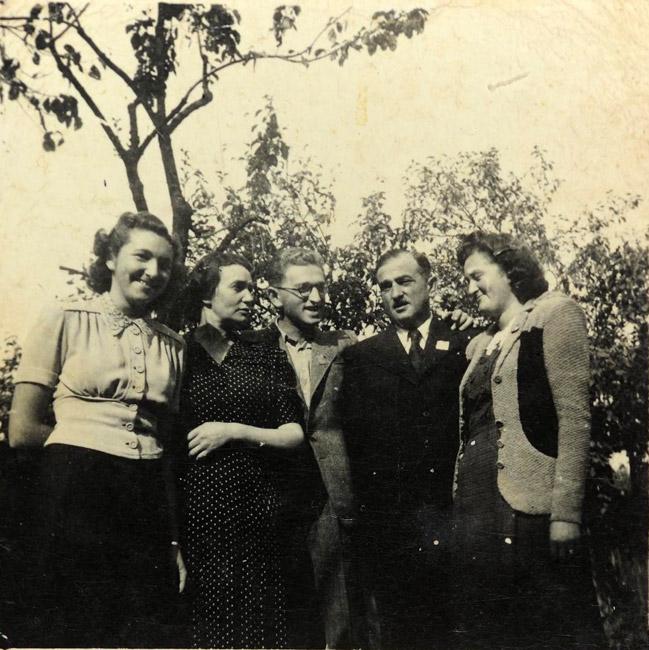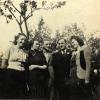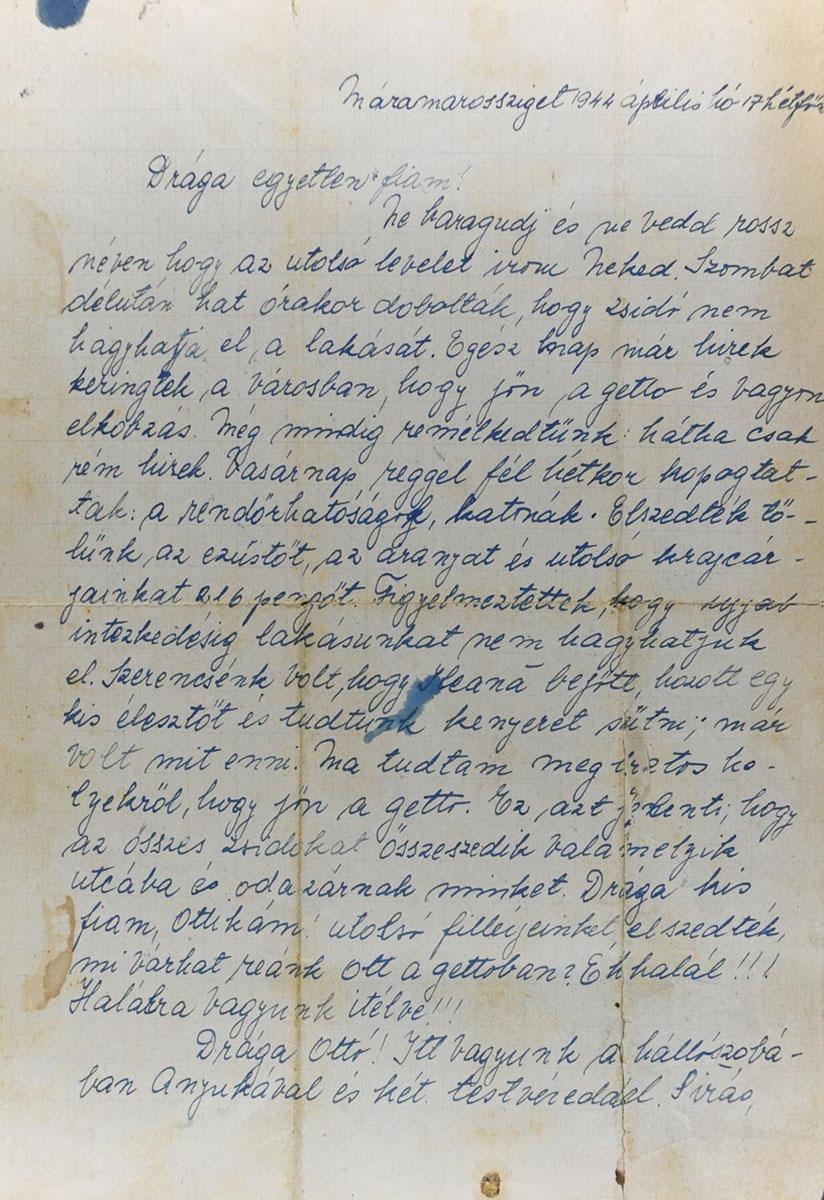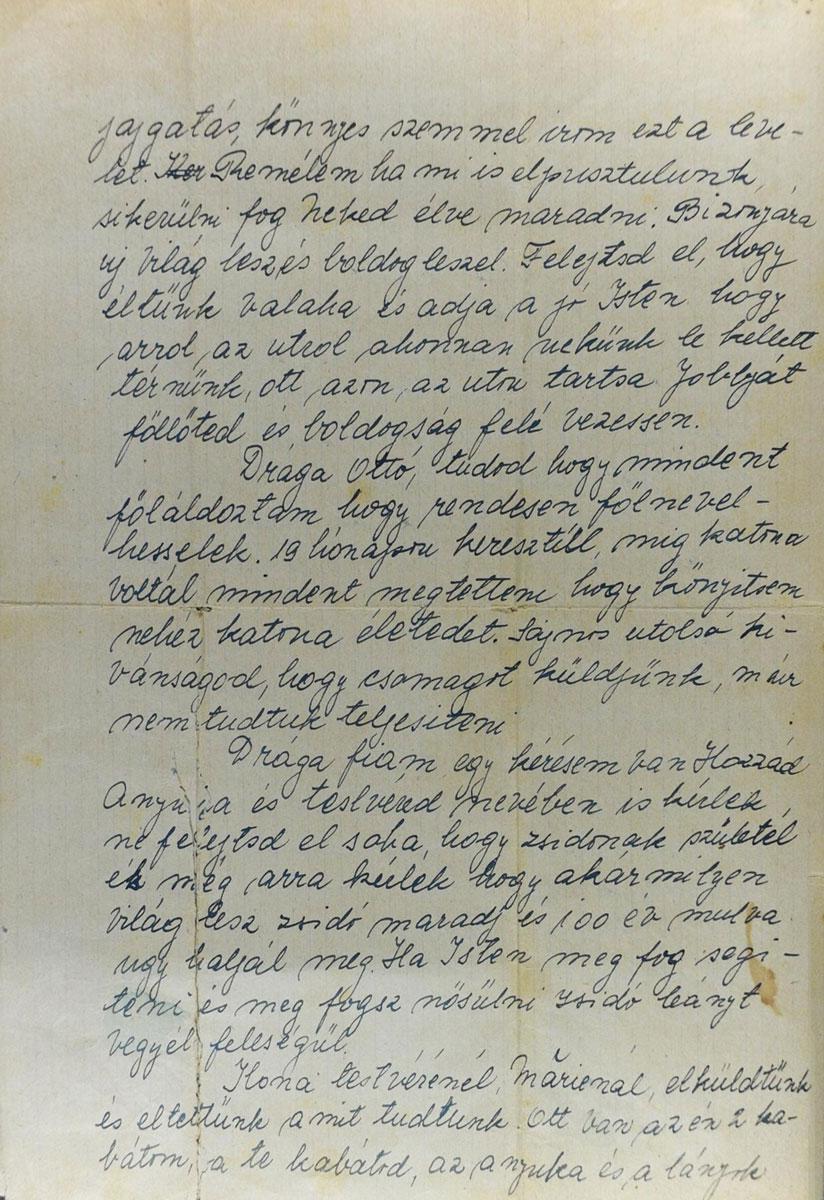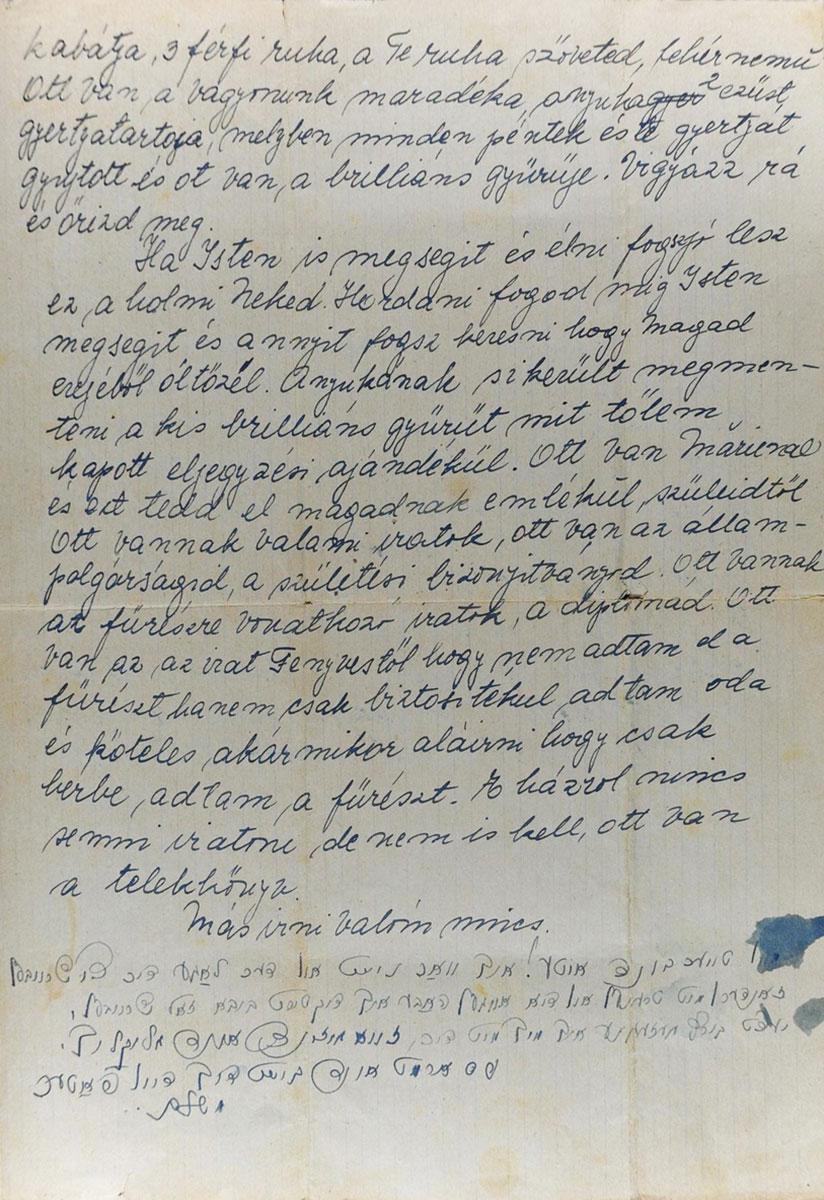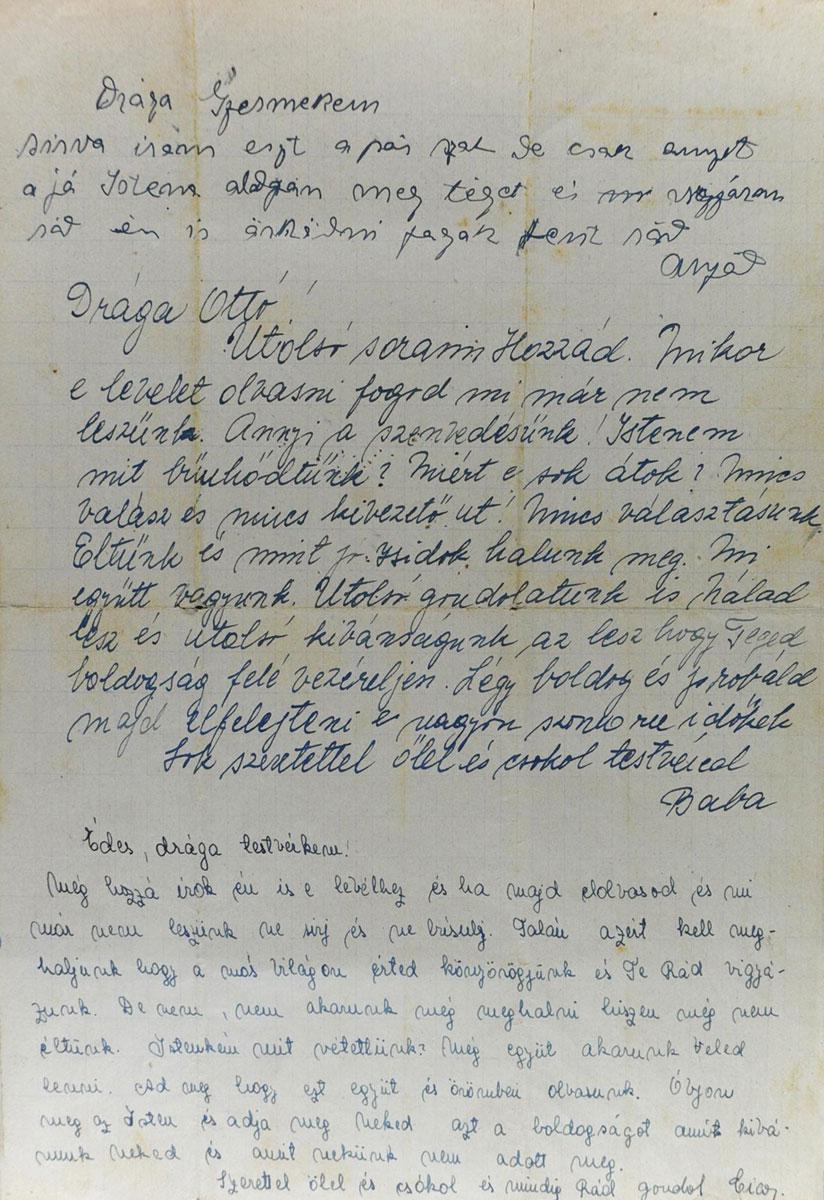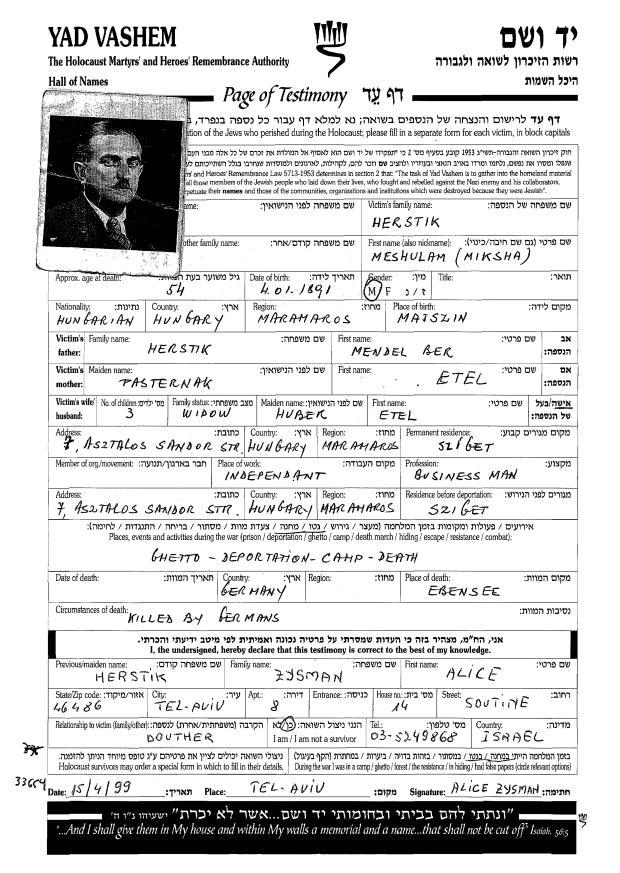Information about the planned transfer to the ghetto left Meshulam in no doubt of the fate awaiting them. Thus, on his initiative, on 17 April 1944, the eve of their transfer to the ghetto, the family members sat down to write a farewell letter to their son, Otto Herstik, who had been conscripted to a labor battalion in the Hungarian army. They gave the letter to their non-Jewish maid Ilana, in the hope that their Ottto would return safely from the war and receive it from her.
What do parents write in a leetter conveying their final words to their son? What are the words with which they part for eternity?
Dear Otto,
We are all in the bedroom, Mother and your two sisters; we are shouting and crying. I am writing this letter with tears in my eyes. I hope that even if we are killed, you will remain alive. I am sure that there will be a new world and that you will live in happiness. Forget that we ever lived. May G-d outstretch his right hand over you on the path that leads to happiness, the path that we have to leave.
Meshulam blesses his son with a happy future. With that in mind, he tells him not to dwell on painful memories of the past but that, nevertheless, he should never forget his identity.
My dear son, I have but one request, which is also in the name of your mother and sisters: Never forget that you were born a Jew. Our request is that you remain Jewish and that in a hundred years, you should die as a Jew. Please G-d, should you marry, only take a Jewish woman to be your wife!
The parents, worried about the future of their son who was to be left alone in the world, do their best to equip him with whatever practical resources they can lay their hands on:
We have left whatever we could salvage with Maria, Ilana’s sister: my two coats, your coat, Mother’s coat and the girls’ coats, three suits, fabric for a suit for you and underwear… if please G-d you should stay alive, these things will come in useful until you are able to earn enough to buy clothes, with G-d’s help and your own strength… She also has your citizenship papers, birth certificate and matriculation certificate… I have no paperwork relating to the house, there is no need because it is registered at the land registry.
The parents add some sentimental items from home in addition to the practical supplies:
We have left the remainder of our belongings with her [Maria] – Mother’s two silver candlesticks that she lit every Friday night and her diamond ring… Mother managed to save the small diamond ring that I bought her when we became engaged – it is with Maria. Look after it as a keepsake from your parents.
At the end of the letter that Meshulam dictated to his daughter Baba (Rakhel), he adds a few lines in his own hand in Yiddish:
Otto, my dear boy!
I wasn’t in a fit state to write to you. With tears in my eyes I dictated the above lines to Baba. Now I part from you. Be healthy and happy.
Hugs and kisses,
Your father, Meshulam.
With a few pain-filled words, Otto’s mother Etel also parts from her son:
My dear son,
I write these lines to you with tears in my eyes. My G-d bless you and protect you,
I will also watch over you from above.
Mother.
Their pain and inability to reconcile themselves with the terrible fate that awaited them cries out from his sisters’ words.
Dear Otto,
My final lines to you. By the time you read these lines we will no longer be alive. So much suffering! G-d – What sin did we commit?! Why so many curses?! There is no answer and no way out and no choice…
Hugs and kisses,
With lots of love,
Your sister [Baba-Rakhel]
My dear sweet brother,
I will also add a few lines to this letter. And when you read it and we are longer among the living… don’t cry and don’t descend into black bitterness. Maybe we need to die so that we can pray and protect you in the World to Come. But no! We do not want to die yet. We have barely lived. G-d, what sin have we committed? We still want be together, with you. [G-d,] help us, so that [in the future] we will be able to read this letter together, happily … Hugs and kisses with love and thinking about you always,
Ziza [Alice]
The parents’ prayers for their son were answered.
Following the Nazi occupation, conditions in the labor battalions worsened, and the conscripts were subjected to forced labor. Otto and his friend decided to flee. His friend was killed during their escape. Otto continued alone to the forests, until he came upon a Russian patrol. He was transferred to a camp for German and Hungarian Prisoners of War where he was the only Jew. Fearing for his fate as the sole Jew amongst enemy soldiers, Otto addressed the camp commander in Yiddish , telling him that he was Jewish and that this was not the place for him. Luckily for him, his words fell on sympathetic ears – the camp commander was a Russian Jew who understood Yiddish. He arranged food and protection for Otto and later enlisted him into the Red Army, where he served until the end of the war.
The Sighet ghetto was liquidated, and its inhabitants were deported to Auschwitz in four transports on 16-22 May 1944.
In Auschwitz the members of the Herstik family were separated. Meshulam was apparently sent to the gas chambers. Etel and her daughters were assigned to work in the camp. They stayed together throughout their time in the camp (Etel’s daughters explain her survival in the camp by virtue of the fact that she always looked much younger than her actual age, even when she died, just days before her hundredth birthday). With the evacuation of the camp, Etel, Rakhel and Alice were forced on a death march in the snow to a camp in Czechoslovakia. On the day of liberation, 8 May 1945, the Germans disappeared. Over the course of a month they made their way to Budapest, and from there returned home to Sighet.
At the end of the war, Otto fled from the army on the advice of his commander, who could not formally release him. In light of the risk that he might be caught as a deserter, his commander recommended that he take a roundabout route and even provided him with a horse. Otto reached Sighet before his mother and sisters. He didn’t know that they had survived and were located nearby in Budapest. First he met his mother’s brother – Andy Huber. A few days later he saw three familiar figures “that looked like shadows”. Thus was the family reunited, but without their father Meshulam who had been murdered in Auschwitz.
Their house was returned to them three months later. During that time, they made contact with their maid’s daughter who returned their letter, candlesticks, ring and documents. The candlesticks and the ring have been kept to this day and are used by the family. The letter was donated to Yad Vashem by Otto Herstik and his sister Aliza Zussman in February 2011, on Otto’s 90th birthday.
